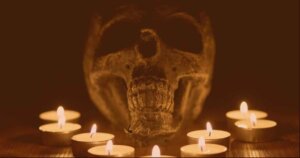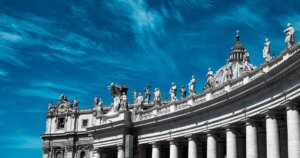One of the primary questions that perplexes the readers of Milton’s Paradise Lost concerns the poet’s delineation of Satan, the chief of the Fallen angels. Throughout the first two or three books of Paradise Lost, it appears as if Satan is the hero of the poem. This is partly because the focus of the poem is all on him. It is also because the first book establishes his strength and struggle. Milton plays against our expectation by spending the first quarter of his epic telling us about the antagonist rather than the protagonist so that by the time we come across Adam and Eve, we are given a profound understanding of the force they are up against.
One important way in which the poet develops the picture of Satan is through epic similes. For example, when Satan is lying on the burning lake, Milton compares him to the Titans (from Greek mythology), who waged war upon Jove. Then, at a greater length he compares Satan to Leviathan, a large whale which is so huge that sailors mistake it for an island. The effect of these similes is to unsettle us, making us aware of the fact that we really do not know how big Satan really is. Moreover, the way Leviathan is shown to deceive the pilot of some lost ship (who feels secured anchoring on his scaly body) immediately associates Satan with deception. Anyone anchoring his soul to this reprobate spirit is bound to sink to the deepest hell. Finally, it is interesting to note that the stature of Satan as presented in the first description is the biggest we will ever see of him. From that point onward his size is described in similes which diminish in hugeness. Therefore, the uncertainty created by these similes arouses a sense of irony.

In Paradise Lost Book I, Milton presents Satan primarily as a military hero. In doing so, he makes his epic follow the tradition of earlier epics, particularly the classical ones—The Iliad and The Odyssey—which center around Military heroes, their expeditions and exploits. At the same time, Milton presents an implicit critique of a literary culture which glorifies warfare. Satan at least extensively displays the virtues of a great warrior such as Achilles or Odysseus. Milton is clearly aware of what he is doing in presenting Satan as heroic. By drawing our sympathetic attention towards Satan, Milton forces us to question why we admire martial prowess in literary figures. Eventually, taken all the twelve books together, Milton tries to show that the Christian virtues of obedience, humility and forbearance are more desirable than the Satanic vice of pride and obstinacy.
Milton’s presentation of Satan makes him greater than what he actually is. Further, because the other characters of the poem, such as Adam, Eve, God and the angels, are essentially “types” rather than “round” characters, Milton spends more artistic energy on the development of Satan. This is why, throughout the poem, Satan’s character maintains reader’s interest. It is also true that evil can be concealed within glitter, glamour and superficial attractiveness. Then, Satan’s character relates to the conflict between appearance and reality, a recurrent motif in great Renaissance writers including Shakespeare.

By making Satan attractive, Milton attempts to reveal the attractiveness of evil and how it walks the “primrose path” to “everlasting bonfire.” In the first book itself, Satan is established as a necessity to propagate God’s goodness:
“…to bring forth
Infinite goodness, grace and mercy shown/
On man…”
For a puritan like Milton, the ruler of the golden Pandemonium can never be a glorified spirit.
However, for the romantic critics, such as Blake and Coleridge, Milton appears to be a supporter of Satan’s independent and indomitable spirit. It could be because, the Romantics were much influenced by the philosophy of the French Revolution and somehow lacked the objectivity to understand Milton’s position. Milton did not write Paradise Lost when he was rebelling against the King. He wrote it when he was disillusioned with that rebellion. To call Milton a supporter of Satan is to have a biased opinion. While Satan is a remarkable speaker, both motivating and convincing (“What though the field be lost…“, “Better to reign in Hell than serve in Heaven”, “Awake, arise, or be forever fallen”), Milton never fails to display Satan’s real self. He calls him the “infernal serpent”, with “semblance of worth” (not real worth). Satan is presented as a seducer and a reprobate spirit who uses guile and fraud to cause trouble instead of preferring direct declaration of war. He compares Satan to the eclipsed moon, which has clear sinister associations. The tears that he sheds are artificial (“such as angel’s”, not truly angelic), he deliberately tries to channelize the emotions of his followers through dramatic gestures and words. While he talks about his freedom in Hell, he takes it for granted that he has the right to rule over the other fallen angels. He sounds like a champion of individual freedom but carefully perpetuates his own tyranny in hell. This is not mark of a hero but of a manipulative hypocrite. Satan in Paradise Lost Book I is an outstanding example of how charming hypocrisy can be.
Watch Video Lecture on Satan
Additional Reading
Paradise Lost: Significance of the Invocation
John Milton, in his attempt to create an epic presentation of practically the whole act of creation and transgression of...
Read MoreParadise Lost: Complete Synopsis of All Books (I-XII)
John Milton‘s “Paradise Lost” is a celebrated epic in English Literature. He transforms the Biblical account about the Fall of...
Read MoreRebel Angels in Paradise Lost : Milton’s Myth Making in Book 1
John Milton’s presentation of the rebel angels in Paradise Lost, as they rise from the lake of fire and light...
Read More






Very condensed analysis. Thank you.
yes we designed it ourselves. thanks